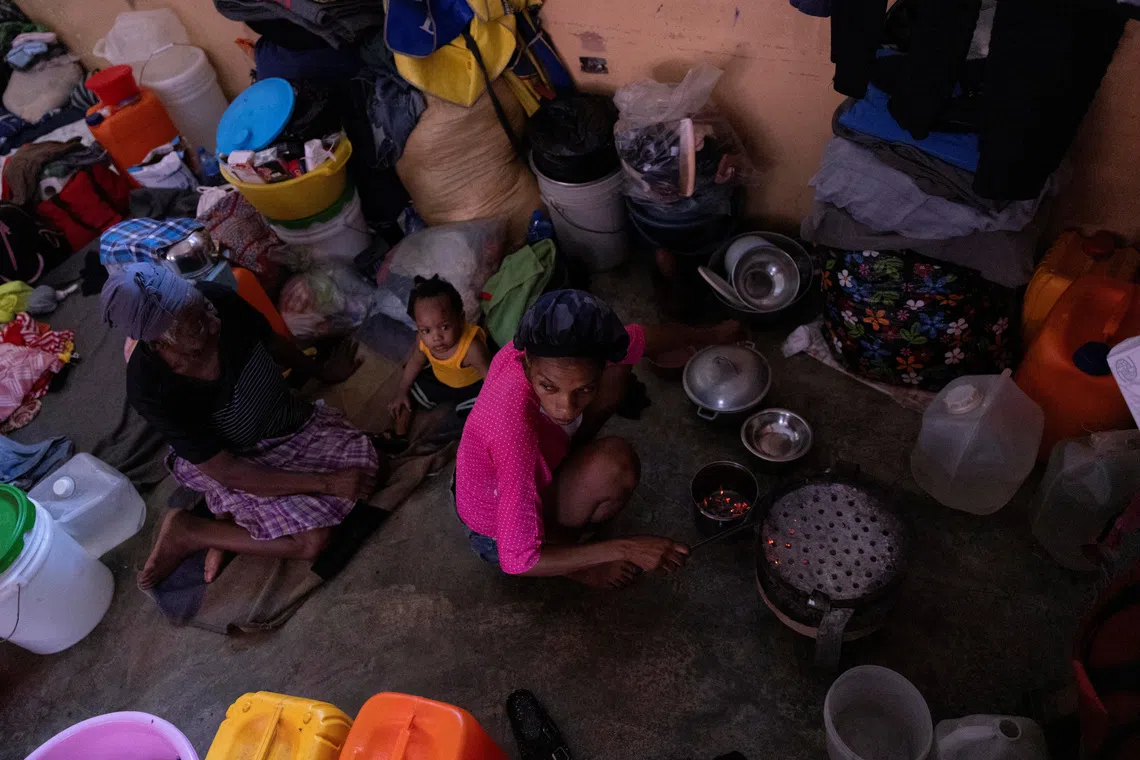Haiti gang warfare stalls long-awaited elections
Sign up now: Get ST's newsletters delivered to your inbox

A woman displaced by gang war violence cooks inside a classroom at the Darius Denis school, which has been turned into a shelter, in Port-au-Prince, Haiti May 5, 2024. REUTERS/Ricardo Arduengo
Follow topic:
Haiti will not hold a general election before the end of the current interim government's mandate next February, the head of the country's electoral council told Reuters on Wednesday, as the expansion of armed gangs makes any hope for a full and stable vote impossible.
The Caribbean's most populous nation has not held elections since 2016. Its last president, who repeatedly delayed elections, was assassinated in 2021. Armed gangs have since taken control of much of the capital and surrounding areas.
"We cannot hold elections before February," electoral council president Jacques Desrosiers said. "It is impossible."
The council in June conducted an evaluation of hundreds of voting centers around the country, though many communes were inaccessible due to the insecurity. Access has since worsened as gangs have expanded in areas outside the capital.
"A lot has changed now," Desrosiers said, adding that new areas cut off from electoral registries include the towns of La Chapelle and Liancourt in the lower Artibonite, Haiti's main agricultural region.
At the start of the year, the interim government had said it planned for elections to take place around November 15 of this year.
In a report disseminated on Wednesday, the U.N. estimated, citing the June evaluation, that just over 6 million people - around half the population - might have access to working voting centers. Desrosiers said he could not provide a current estimate.
"Critical decisions will be required by national authorities and stakeholders in the coming months in the lead-up to the 7 February 2026 deadline," U.N. Secretary General Antonio Guterres said in the report.
"Haiti cannot afford a political vacuum."
TRANSITION OF POWER
February 7 marks the end of the term envisioned for the nine-member transitional presidential council, which took power in April 2024.
That February 7 date has traditionally marked the constitutional deadline for handing over power, and is often met with protests, as it has been flouted in the past by leaders refusing to step aside. The day will have particular salience in 2026 as it would have been the presidential handover had an election taken place five years previous.
Haitian political groupings are divided over how to move forward, with some calling for an extension or modification of the interim presidential council and others for it to step aside in favor of a Supreme Court judge.
Meanwhile, Haiti's Viv Ansanm gang alliance - which controls most of the densely populated capital Port-au-Prince - has declared itself a political party and called for dialogue with the establishment.
Washington has designated the group as a terrorist organization, with its members accused of thousands of killings, as well as widespread kidnappings, torture, arson and gang rape. Gangs also often provide key services and food in areas they control.
Around half of Haiti's 12 million-strong population faces severe food insecurity and over 1.3 million are internally displaced due to the violence, many living temporarily with friends or families or in crowded displacement camps. REUTERS

